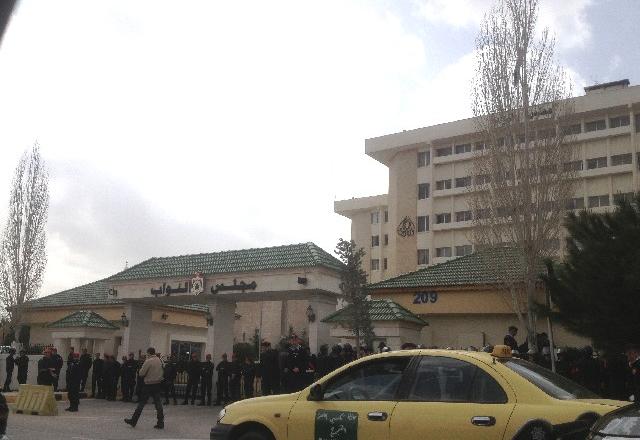You are here
Israel expresses ‘deep regret’ over Jordanian judge’s death
By Khetam Malkawi - Mar 17,2014 - Last updated at Mar 17,2014

AMMAN — His Majesty King Abdullah on Monday received phone calls from Israeli President Shimon Peres and Prime Minister Benjamin Netanyahu, during which they expressed “deep regret” over the killing of Jordanian Judge Raed Zuaiter last week, a Royal Court statement said.
Meanwhile, analysts described the development as a positive and a “face saver” for the government, which, in turn, says it is ready to reply to lawmakers’ demands regarding its response to Israel.
Peres expressed his “compassion to the bereaved family and shared their grief”. In a televised statement later Monday, Peres said he reiterated in his phone call with the King Israel’s commitment to moving forward with the joint investigation with the Jordanian side of the incident, the Jordan News Agency, Petra, reported.
The Israeli president also stressed his keenness to continue working with His Majesty and Jordan towards achieving peace in the region.
The King received a similar call from Netanyahu.
Face-saving for government
The expression of regret comes one day before a House session is planned for lawmakers to discuss two motions of no-confidence in the government.
The motion planned for Tuesday is in response to the “government’s attitude towards their demands” especially those associated with the killing of Zuaiter last Monday by two Israeli soldiers, which caused public outrage.
However, according to Deputy Mustafa Yaghi, a member of the Lower House Legal Committee, the Israeli move might lead deputies to take back some of their demands.
Yaghi, who is one of the deputies who filed the motion, said the Israeli statement is likely to avert the move that might lead to government change.
Yet the motion remains “a wake-up call for the government”, the lawmaker said.
The Lower House called on the government to expel the Israeli ambassador in Amman and recall the Jordanian ambassador from Tel Aviv, among other steps requested by MPs to protect “citizens’ dignity”.
Other demands include abolishing the 1994 Wadi Araba Peace Treaty and the release of Ahmad Daqamseh, the Jordanian soldier who killed seven Israeli schoolgirls in 1997.
The government is ready — spokesperson
The government has prepared a reply for each of these demands on Tuesday’s session, according to Mohammad Momani, the government’s spokesperson.
“We will have a statement replying to all these demands,” Momani told The Jordan Times on Monday without providing any further details.
However, he added that the government has formed the team that will take part in the joint investigation with the Israeli side into Zuaiter’s death.
“This committee will document the proceedings of the investigation and will report to us,” Momani said.
Can Jordan afford to sever diplomatic ties with Israel?
Saad Abu Dayyeh, a political science professor at the University of Jordan, said neither Jordan nor Israel can cut diplomatic relations established under the Wadi Araba treaty.
Article 5 of Wadi Araba treaty says: “The parties agree to establish full diplomatic and consular relations and to exchange resident ambassadors within one month of the exchange of the instruments of ratifications of this treaty.”
However, Abu Dayyeh argued that maintaining diplomatic relations between the two sides is needed at this time of crisis.
He explained that before escalating the situation, lawmakers should wait for the results of the investigation and if the probe established that Israel is accountable, Jordan can ask for compensation and it may resort to international courts if the other side does not respond to the demands.
‘Deputies are in trouble’
According to Hassan Barari, a political analyst and an expert in Israeli affairs, deputies are in trouble and the government has the solution to save them.
Barari argued that severing diplomatic ties with Israel and annulling Wadi Araba treaty have to do with the state rather than the government.
“Even if deputies voted out the government, any new government would not be able to take such a decision.”
The analyst added that keeping diplomatic ties with Israel serves the national interest of Jordan, which is a key stakeholder in the Mideast peace negotiations led by US Secretary of State John Kerry.
“Expelling the Israeli ambassador will weaken Jordan’s role in the process,” Barari told The Jordan Times.
He said Prime Minister Abdullah Ensour can suggest postponing the motion of no-confidence until results of investigation come out and in this way, “he can also spare lawmakers the trouble”.
For Nadia Saededdin, head of Palestinian affairs department at Al Ghad daily, although the demands of deputies are “realistic”, the government will never annul the Wadi Araba treaty. “There are steps that the government can take and others it cannot with regards to the lawmakers’ demands,” Saededdin told The Jordan Times, adding that for the time being, and as part of a settlement, the government might settle for an apology and taking part in the investigation committee.
She argued that based on the results of the investigation, the government might recall the Jordanian ambassador in Tel Aviv.
Related Articles
The Lower House on Wednesday postponed a discussion over a vote of no-confidence petition to next week, giving the government almost a week to act and meet the MPs demands over measures against Israel after occupation soldiers shot and killed a Jordanian judge.
The government on Tuesday survived a no-confidence motion over what some deputies described as its failure to properly respond to the killing of Judge Raed Zuaiter, who was shot dead by Israeli soldiers last week.
Jordanian people, government and Parliament reacted with anger over the killing of Jordanian Judge Raed Zuaiter by Israeli soldiers on Monday.


















